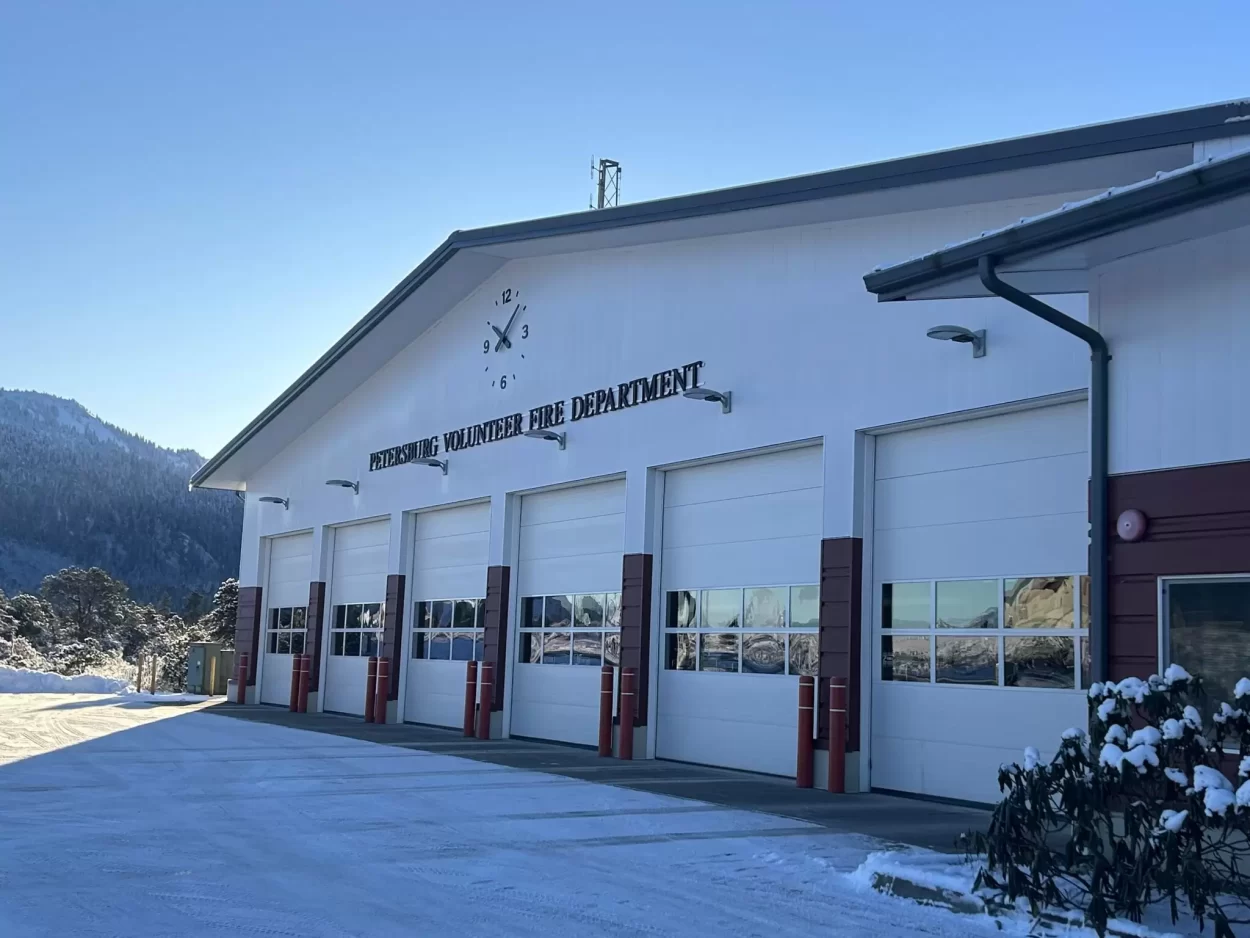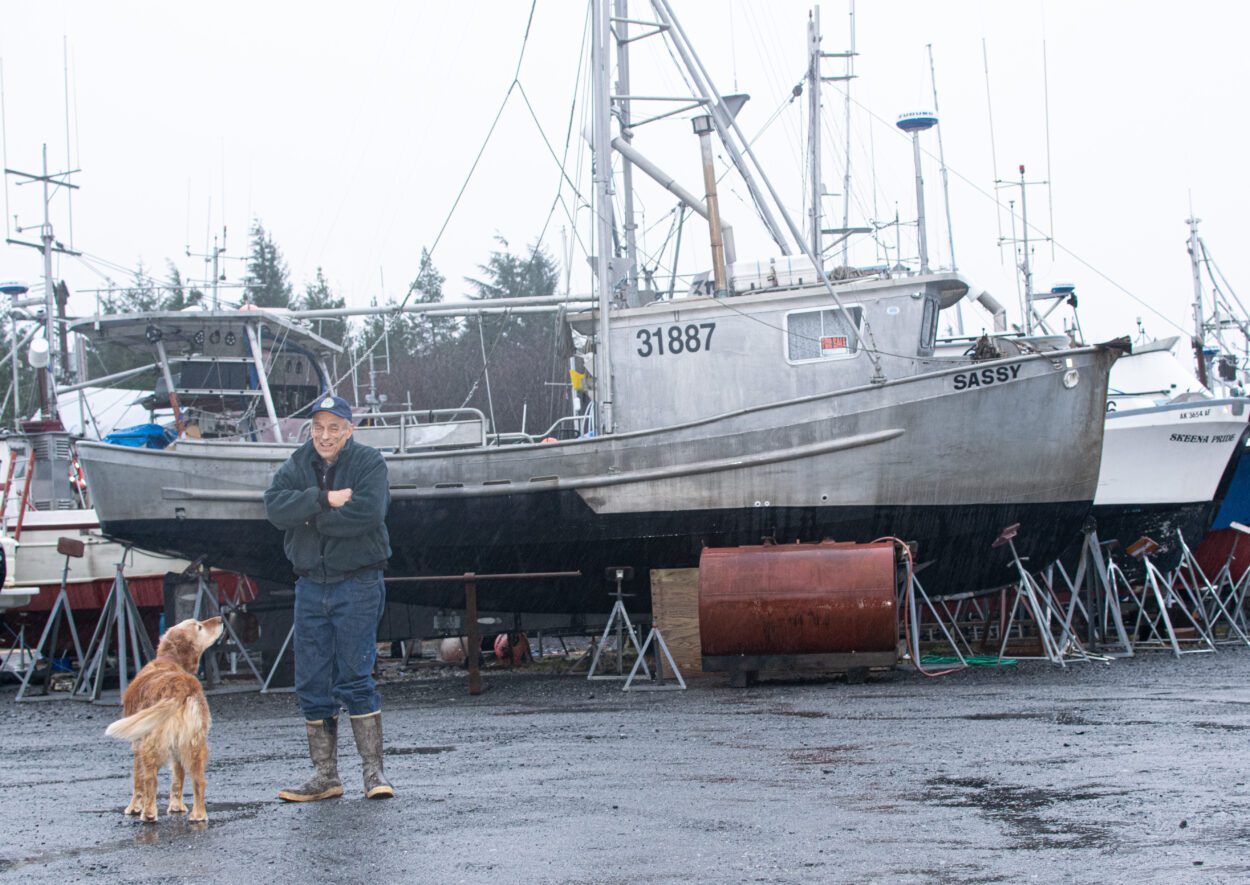
Petersburg’s Borough Assembly in December voted down a resolution to give a decommissioned fire truck to Hyder’s new volunteer fire department. Now, it will go to a public auction.
As KFSK’s Shelby Herbert reports, some Assembly Members were swayed by a local businessman who wants to use the truck to protect his boatyard.
John Murgas was listening to KFSK’s evening news broadcast in his workshop on December 18th when something caught his ear. He learned that the Borough Assembly was looking at practically giving away Fire Engine No. 5 — a truck he actually used to drive around when he was a volunteer firefighter years ago.
“I just got excited when I found out it was such short notice that it was leaving town,” said Murgas. “It’s like, oh my God — tomorrow I might see it on the ferry terminal and be gone.”
The Petersburg Volunteer Fire Department took the engine out of service in early December. They determined that the almost 33-year-old truck has a low resale value and wouldn’t be of much use to most fire departments. But they said that it *could* be of use to a community that doesn’t have any firefighting equipment at all — like the City of Hyder, on the border with Canada. The Borough was looking at selling it to the burgeoning fire department for just one dollar. When Murgas heard the news, he rushed out the door, checkbook in hand. At that night’s Assembly Meeting, he said he’s willing to put down at least $10,000 for the engine. And that’s so he can protect his property — and his customer’s property — in an emergency.
“It just has so much value to the community. I think it would behoove the residents to have that here for us to use.
Murgas owns and operates Petersburg Marine, a shipyard in Scow Bay, about three miles outside town. He’s still haunted by a boat fire that happened at his business a couple years ago. The Nitty Gritty, a 31-foot commercial fishing vessel used for gillnetting and trolling, caught fire on a spring afternoon in 2021. Firefighters suspected that an electric heater onboard sparked the blaze. It took them about 10 minutes to get to the boatyard, which is about three miles away from Petersburg.

“The fire quickly progressed into open flames before the fire trucks got here. And then they attacked it with their hose lines and so forth. By then, it was pretty much fully engulfed. And to make his long story short here is the end result…
Murgas pulls up some pictures he’s kept of the charred boat — its fiberglass cabin and engine compartment melted from the heat of the flames. It was a total loss. As a retired firefighter, Murgas says he has intimate knowledge of the extended length of time it can take for emergency personnel to reach fires that happen outside of town — like the one at his boatyard.
“When a boat catches on fire, there usually isn’t much time to respond,” said Murgas. “The amount of time it would take to go back to Scow Bay Fire Hall and get something rolling and getting out there would be many minutes.”
And that’s why, Murgas said, he wants to buy the fire engine — because having firefighting equipment on site could shave off valuable response time.
Aaron Hankins is the director of Petersburg Fire and EMS. He acknowledges that it can be hard to quickly reach fires that happen out of town. But he says people who live even farther outside of town — outside Service Area 1 — could have more trouble getting help. Petersburg Fire Department actually has to get permission from the Borough to respond to fires more than about nine miles out of town. Hankins says they pretty much always get the Borough’s blessing. But there’s a catch.
“We like to help our neighbors, we certainly want to help everyone,” said Hankins. “But our first duty is to Service Area 1 — [to the] the people who foot the bill for the fire response.”
He says their policy is that if they get called out to fight a fire outside of Service Area 1, and if then another fire crops up inside Service Area 1, they have to drop everything and return to Petersburg to fight that fire. That’s why, Hankins says, he understands why locals might want to bid on the truck. However, he’s also concerned about what could happen when the equipment falls into public hands.
“The Borough Assembly has the authority to do with Borough assets as they so choose,” said Hankins. “I would hope that whoever is using this apparatus trains with it regularly and at least makes sure it’s ready for response.”
And Hankins isn’t alone in his concern. Thomas Fine-Walsh is the only assembly member who voted in favor of giving Engine 5 over to Hyder. He said the Borough’s tradition of giving away decommissioned vehicles to communities that need them is not one the assembly should just throw aside.
“I understand the desire to keep these resources local,” said Fine-Walsh. “But I think in the broader scheme of things, in terms of the overall value of the borough’s vehicle assets and our budget, this is quite small. And I think it can make a really big difference for a community like Hyder.”
Hankins says he still thinks auctioning off the fire engine is a bad idea — but his hands are tied. So, he says there are three things he wants potential buyers to be aware of.
First: maintenance costs. Hankins says fire trucks like Engine No. 5 are made-to-order. So, whoever buys it could have a hard time securing new parts.
“The impellers for the pumps, the chassis itself, the boxes — everything is all custom,” said Hankins. “And [when] you have to say, ‘Okay, I need this part, can you make it for me?’ [They’ll say,] ‘Well, we don’t make that part anymore. We’re gonna have to find someone to custom make it or custom mold it.'”
And, second: he thinks it’ll be difficult for the buyer to secure the water they need to actually put out fires. Unauthorized users — meaning, anybody who isn’t an emergency responder using an emergency vehicle — aren’t allowed to hook up their hoses to fire hydrants. So, the buyer would have to draft the water on their own.
“The only way you’re gonna get water out there is to pull it out of the ocean, or pull it out of the creek,” said Hankins. “[And then] you’re fighting with DNR to get permission to do that.”
And third: liability. Hankins says that any member of the public who fights a fire on another person’s property could be held accountable for things that go wrong.
“The private entity that is operating assumes all liability for its response,” said Hankins. “All of it.”
Murgas, for his part, is undeterred.
“Every person in their youth — every little boy dreams of being a firefighter,” said Murgas.
The Borough has not yet set a date for the auction of Engine No. 5. The proceeds from the sale would go back into Petersburg Volunteer Fire Department’s motor pool funds.











